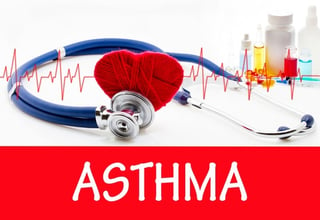What is Asthma? And what is Asthma attack?
The air that you breathe goes from your mouth and nose to your lungs. The lungs are made up of airways that get smaller and smaller, like the branches of a tree. Asthma is a chronic disease of the airways (breathing tubes) in the lungs.

During an asthma attack, three things happen:
- The airways are squeezed a little. Tiny muscles around the airways squeeze like rubber bands that are just a little tight.
- The sides of the airways swell up. This makes the airways sensitive to things that start asthma attacks.
- The insides of the airways make too much mucus.
All of these changes make the airways narrow, so it is hard for air to go in and out of your lungs. This can make it hard to breathe and cause other asthma symptoms like coughing and wheezing.
Acute bronchospasm caused by asthma is also referred to as an asthma attack.
How to diagnose asthma?
Your health care provider will ask you about your medical history and perform a physical exam. A chest X-ray or blood testing may be performed to look for other causes of your symptoms or other conditions that may have triggered your asthma attack.
What causes asthma?
Many different things (called triggers) can make asthma worse:
- Allergens – pollen, pets, cockroach, mold, dust mites
- Irritants – smoke, perfumes, cleaning products
- Colds, weather changes, exercise, emotions
- Others including Strong emotions such as crying or laughing hard, Stress, Certain medicines such as aspirin or beta-blockers, Infections or inflammatory conditions, such as a flu, cold, or inflammation of the nasal membranes ,Gastroesophageal reflux disease (GERD). GERD is a condition where stomach acid backs up into your esophagus.
It is important to learn about your asthma triggers, since they can be different for different people. Knowing your triggers and how to avoid them can help keep you healthy.
What are asthma symptoms?
Symptoms are what you feel in your body. Everybody is different, but here are some common asthma symptoms:
- Cough
- Shortness of breath
- Wheezing
- Chest tightness or chest pain
You might have just some or all of these symptoms at times. They might not bother you much or they might feel very bad if your asthma is flaring up.
What can you do to control your asthma and prevent symptoms? (Asthma Attack Prevention)
There is no cure for asthma, but there is a lot you can do to control your asthma so that you can live a normal, active life and sleep through the night without asthma problems.
Medicine will open up the airways. One kind is taken every day to keep swelling down. Another kind relaxes the muscles during an asthma attack so the muscles will not squeeze the airways.
Talk to your doctor if you have more symptoms than usual or need to use your quick-relief medicine more often.
You can prevent asthma attacks by:
- Taking your medicines as directed.
- Avoiding things that can irritate your airways or make your asthma symptoms worse.
- Keeping track of how well your asthma is controlled and of any changes in your symptoms.
- Responding quickly to worsening asthma symptoms.
- Seeking emergency care when it is needed.
How to monitor my Asthma?
Use your peak flow meter and record your results in a journal every day. A drop in your peak flow numbers on one or more days may indicate the start of an asthma attack. This can happen even before you start to feel symptoms. You can prevent an asthma attack from getting worse by following the steps in your asthma action plan.
How to avoid Asthma Triggers?
Work with your asthma health care provider to find out what your asthma triggers are. This can be done by:
- Allergy testing.
- Keeping a journal that notes when asthma attacks occur and the factors that may have contributed to them.
- Determining if there are other medical conditions that are making your asthma worse.
Once you have determined your asthma triggers, take steps to avoid them. This may include avoiding excessive or prolonged exposure to:
- Using a high-efficiency particulate arrestance (HEPA) vacuum is best.
- Pet dander. Avoid contact with animals that you know you are allergic to.
- Allergens from trees, grasses or pollens. Avoid spending a lot of time outdoors when pollen counts are high, and on very windy days.
- Very cold, dry, or humid air.
- Foods that contain high amounts of sulfites.
- Strong odors.
- Outdoor air pollutants, such as engine exhaust.
- Indoor air pollutants, such as fumes from household cleaners.
- Household pests, including dust mites and cockroaches.
- Certain medicines, including NSAIDs.
Always talk to your health care provider before stopping or starting any new medicines.
Act Quickly
If an asthma attack does happen, acting quickly can decrease how severe it is and how long it lasts. Take these steps:
- Pay attention to your symptoms. If you are coughing, wheezing, or having difficulty breathing, do not wait to see if your symptoms go away on their own. Follow your asthma action plan.
- If you have followed your asthma action plan and your symptoms are not improving, seek immediate medical care at the nearest hospital.
SEEK IMMEDIATE MEDICAL CARE IF:
- You are getting worse.
- You have trouble breathing, call your local emergency services
- You develop chest pain or discomfort.
- You are vomiting.
- You are not able to keep fluids down.
- You are coughing up yellow, green, brown, or bloody sputum.
- You have a fever and your symptoms suddenly get worse.
- You have trouble swallowing.
HOW CAN I LEARN MORE ABOUT ASTHMA?
You can find more information about asthma from these sources:
- American Lung Association: www.lung.org
- American Academy of Allergy Asthma and Immunology: www.aaaai.org/conditions-and-treatments
- National Heart, Lung, and Blood Institute: http://www.nhlbi.nih.gov/health/resources/lung
This information is not intended to replace advice given to you by your health care provider. Make sure you discuss any questions you have with your health care provider
Topic: Pulmonary Blogs







Leave a comment